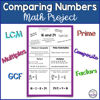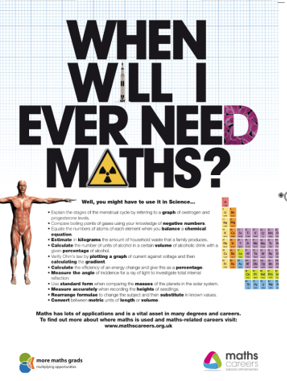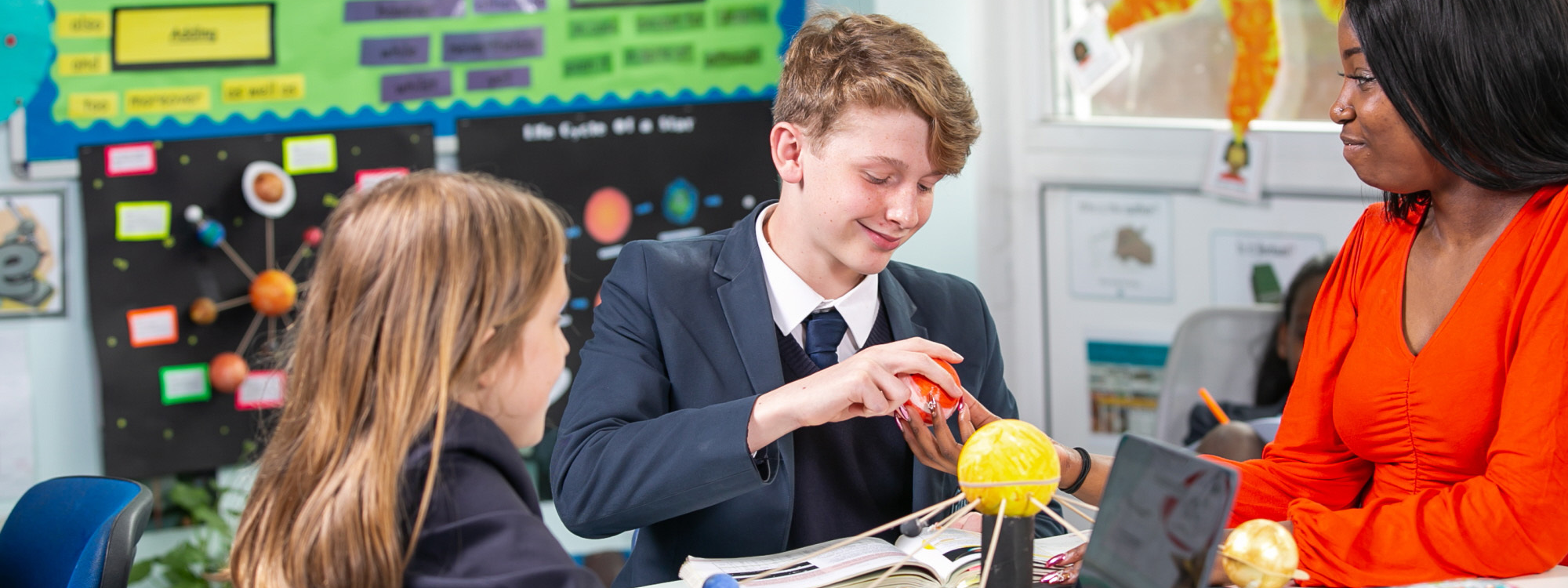Mathematics and Numeracy
Back to Subjects MenuWhat is it to be a mathematician at BCHS?
In KS3, mathematics help students to make connections across the topics and build upon prior key stage 2 knowledge to develop confidence and fluency in maths study.
KS3 Mathematics will also help develop student’s mathematical reasoning and maths problem solving to a higher, more sophisticated level.
Being a mathematician at KS4 is not only about achieving a GCSE in maths at the end of the year, but to see that mathematics is applicable in everyday life. Students get the grades they need so that they a wider range of choices in the next stages of their education.
Some of our mathematicians go on to study A-levels in maths, further maths or core maths at sixth form.
Students taking Mathematics find it to be an enjoyable, rewarding, stimulating and empowering experience. It is a challenging qualification, which both extends and deepens Mathematical knowledge far beyond that of GCSE.
Subject Overview - Year 7-11
Year 7 overview
Number – Within the strand pupils study topics such as multiplying decimals, factors and Multiples and working with fractions
Algebra – Here pupils look at simplifying expressions and solving equations.
Shape – This unit mainly focuses on area and angles.
Statistics – Students will cover averages and probability.
Year 8 overview
Number – Within this, strand pupils study topics such as indices and percentages.
Algebra – Here pupils look at expanding expressions and solving equation
Shape – This unit mainly focuses on area of compound shapes, volume and angle.
Year 9 overview
Number – Within this strand pupils study topics such as fractions, percentages, rounding, HCF and LCM.
Algebra – Here pupils look at substitution, expanding brackets, solving equations and rearranging formulae.
Shape – This unit mainly focuses on angles and trigonometry.
Statistics – Most of statistics content is taught in year 9, looking at various charts and graphs as well as averages.
Year 10 overview
Number –Within this, strand pupils study percentages, direct proportion and inverse proportion.
Algebra – Here pupils look at plotting and interpreting graphs, simultaneous equations and solving quadratics.
Shape – This unit mainly focuses on perimeter, area and volume, and transformations.
Statistics – In Year 10 statistics is very heavily probability based looking at mutually exclusive events, experimental probability, tree diagrams and venn diagrams
KS 4 Overview
Year 9 overview
Number – Within this strand pupils study topics such as fractions, percentages, rounding, HCF and LCM.
Algebra – Here pupils look at substitution, expanding brackets, solving equations and rearranging formulae.
Shape – This unit mainly focuses on angles and trigonometry.
Statistics – Most of statistics content is taught in year 9, looking at various charts and graphs as well as averages.
Year 10 overview
Number –Within this, strand pupils study percentages, direct proportion and inverse proportion.
Algebra – Here pupils look at plotting and interpreting graphs, simultaneous equations and solving quadratics.
Shape – This unit mainly focuses on perimeter, area and volume, and transformations.
Statistics – In Year 10 statistics is very heavily probability based looking at mutually exclusive events, experimental probability, tree diagrams and venn diagrams
Subject Overview - Sixth Form
Year 12 Overview
Statistics - Within this module students will look at analysing and representing data and how this would apply to a large data set. Students will also begin to look at probability distributions and testing hypothesis.
Mechanics -
As well as building on the concepts of acceleration, velocity and gravity, this strand of the curriculum also looks at forces and motion.
Pure Mathematics -
Making up the bulk of the course, pure mathematics is mostly calculus based and develops students knowledge of graphic and algebraic techniques. Skills from GCSE such as trigonometry, co-ordinate geometry and vectors are also built on.
Year 13 Maths overview
Statistics - In Year 13 as well as building on the Year 12 content, students study additional topics linked with correlation and regression as well as conditional probability.
Mechanics - In Year 13 as well as building on the Year 12 content, students study additional topics such as projectiles and friction.
Pure Mathematics - This module mostly focuses on developing the Year 12 skills; particularly trigonometry, integration and differentiation. However some new topics are introduced, such as sequences and series, and parametric equations.
Year 13 Further Maths overview
As with the Mathematics course the Further Mathematics course includes Statistics, Mechanics and Pure Mathematics.
Studying Further Mathematics makes the transition from sixth form to university courses which are mathematically rich easier, as more of the first year course content will be familiar. Further Maths is currently the fastest-growing of all subjects taught at A Level nationally, which reflects the fact that greater knowledge of Maths often results in higher university admission chances. Studying the subject is highly recommended, and an A or A* grade strongly preferred, at such Russell Group universities as Oxbridge, Imperial, LSE and UCL.
Enrichment
KS3
- Students take part in UKMaths Challenge
- Cross curricular activities
- Finance lessons
- Students use NRICH problems in their lessons
KS4
- Summer snack is a fun educational challenge for students, which tests problem solving, and teamwork skills.
- Maths Challenge
- Cross curricular activities
- Finance lessons
- Students use NRICH problems in their lessons.
KS5
- All sixth formers participate in the UKMT senior maths group challenge.
- Students are encouraged to support students in other classes.
- Students are introduced to the STEP and MAT exams
- There is a sixth form library containing books from the recommended reading list of several top universities (including Oxford and Cambridge) for students applying to study maths.

How do we contribute to PHSEE, British Values and SMSC?
KS3
- Probability of real life events happening
- Financial mathematics
- Various methods of multiplication from various cultures are used across the maths department.
- We allow confidence through mastery
- Cross-curricular lessons with other subjects eg science
KS4
- Probability of real life events happening
- Financial mathematics
- Various methods of multiplication from various cultures are used across the maths department.
- We allow confidence through mastery
- Cross curricular lessons with other subjects eg business
KS5
- The difference between correlation and causation
- Financial mathematics
- Exponential modelling of real world problems
- Calculating pay slips
- Ensuring that data collected is representative
What careers does maths support?
Leading to a career in: Financial services, accountancy, engineering, game design, analytical careers.





